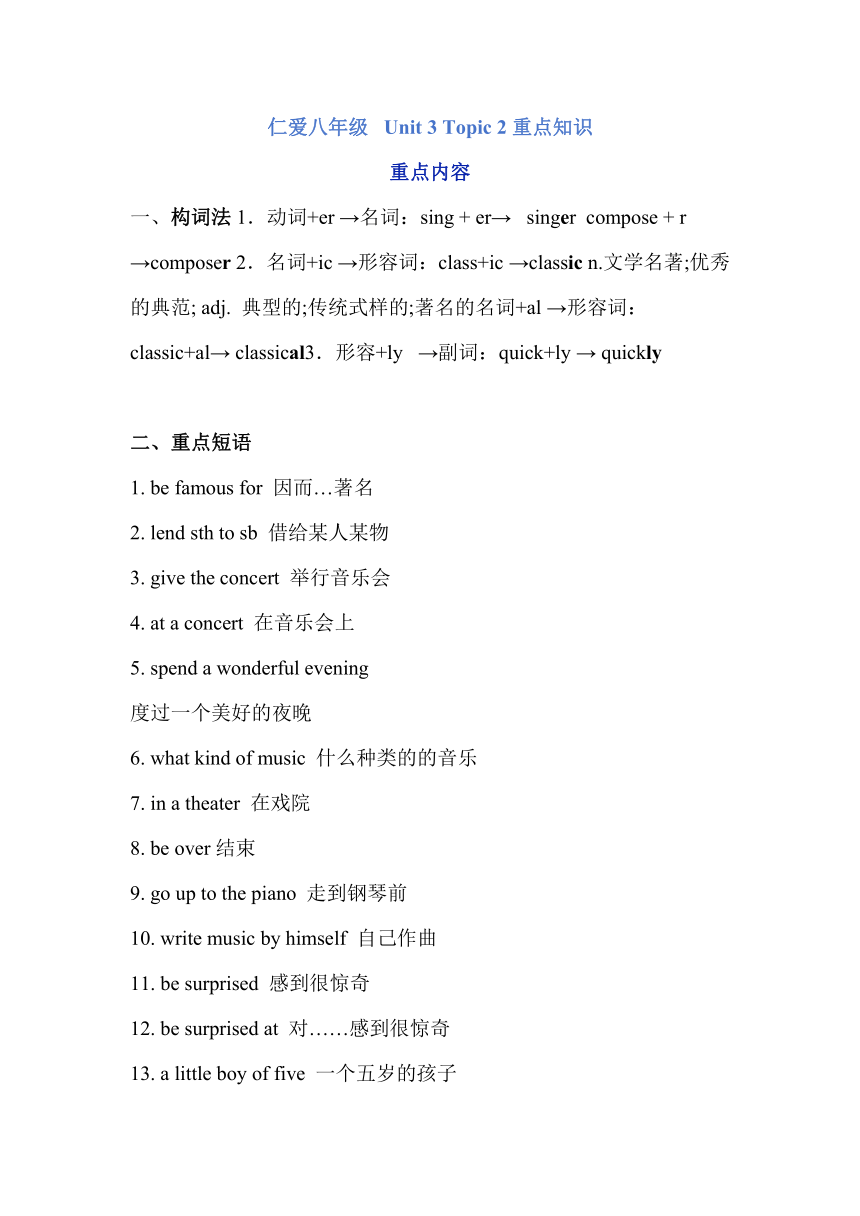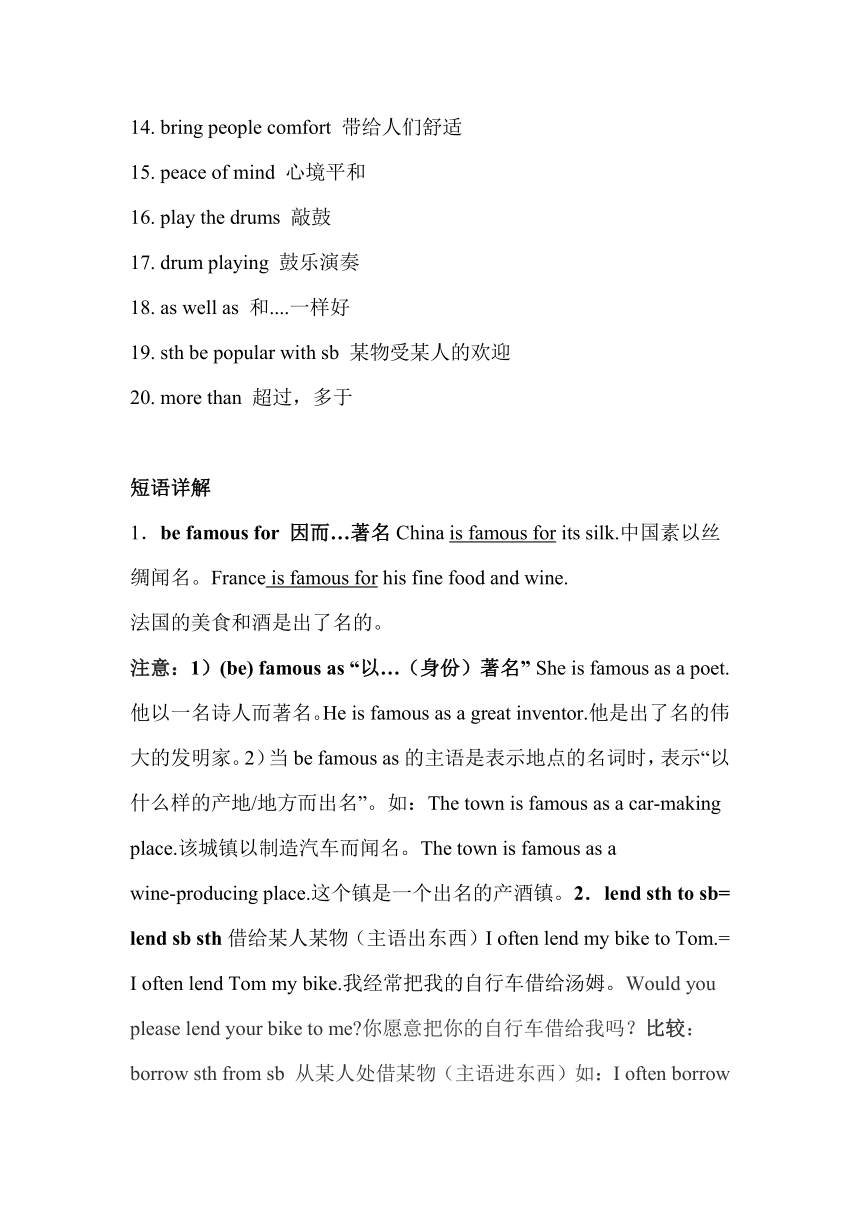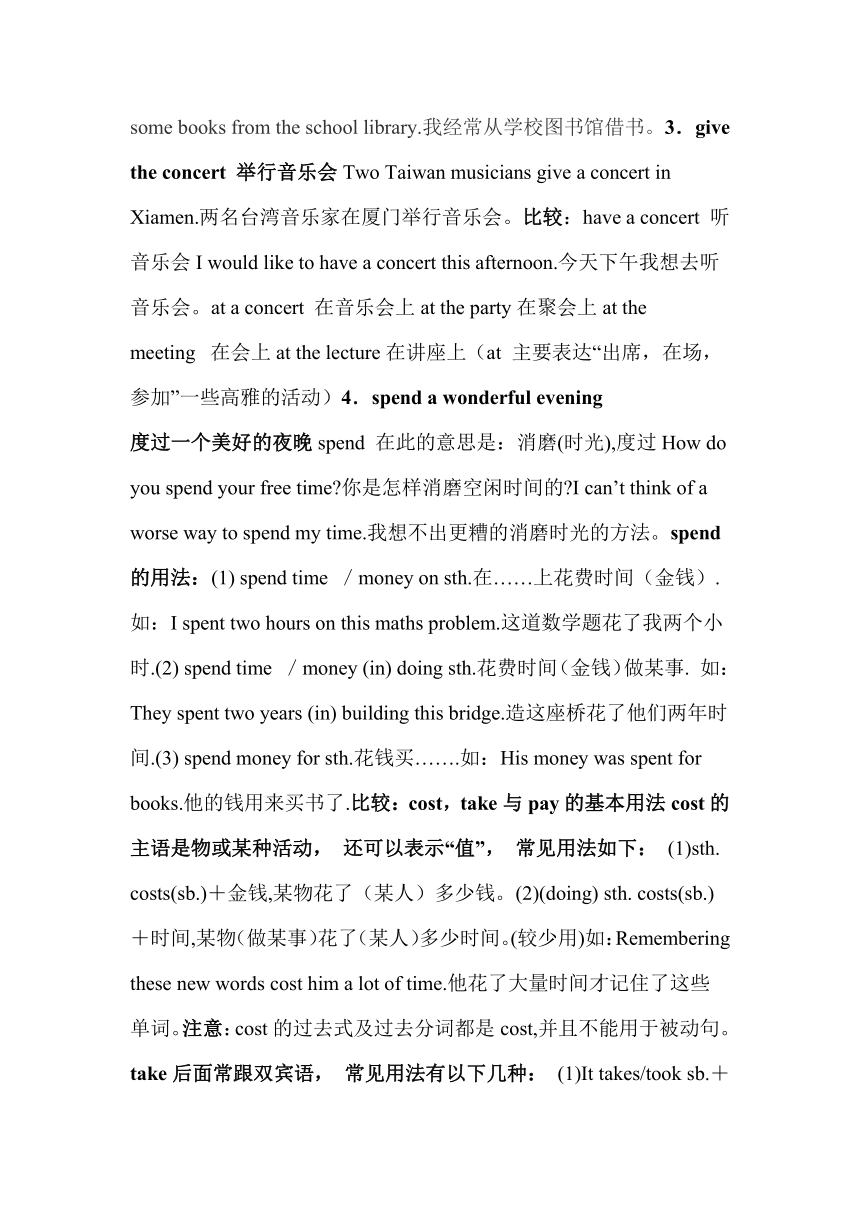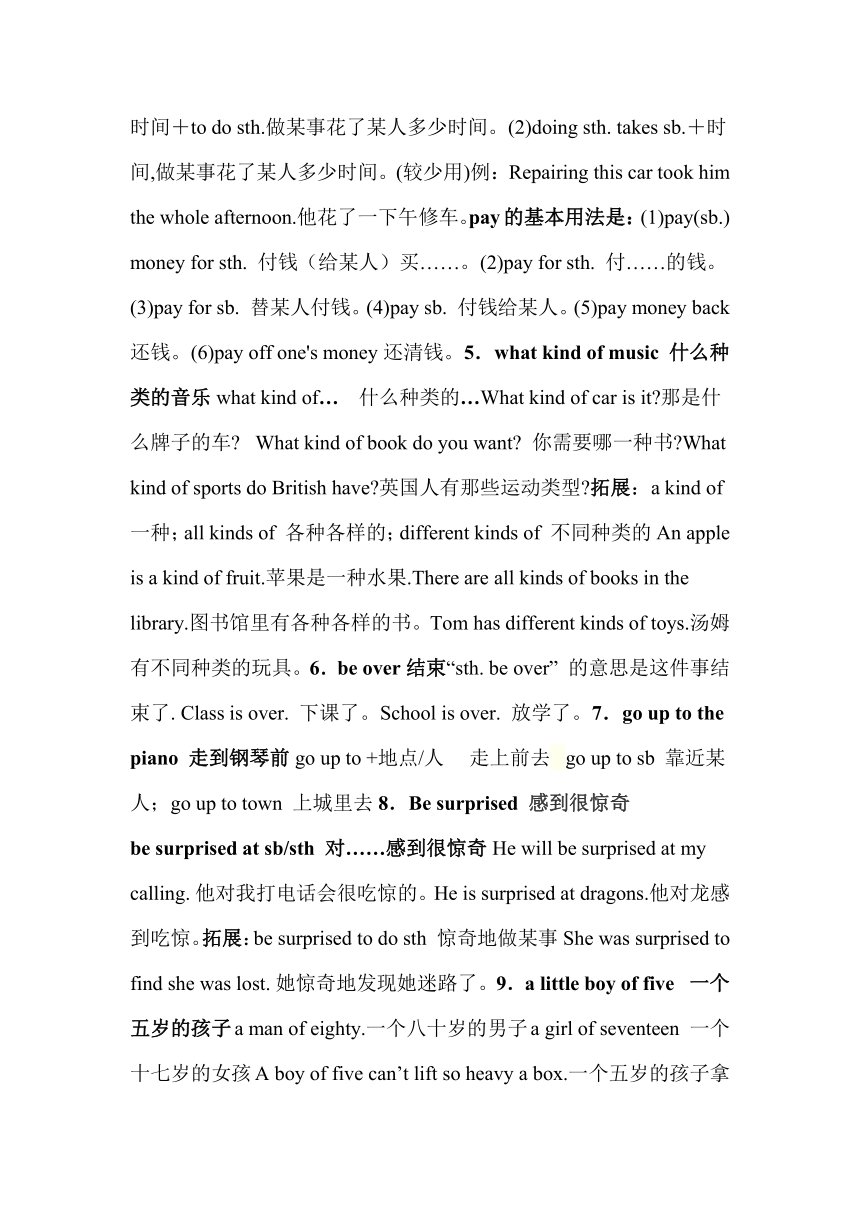Unit 3 Topic 2 What sweet music重点知识 仁爱科普版英语八年级上册
文档属性
| 名称 | Unit 3 Topic 2 What sweet music重点知识 仁爱科普版英语八年级上册 |

|
|
| 格式 | docx | ||
| 文件大小 | 26.6KB | ||
| 资源类型 | 教案 | ||
| 版本资源 | 仁爱科普版 | ||
| 科目 | 英语 | ||
| 更新时间 | 2024-12-30 00:00:00 | ||
图片预览




文档简介
仁爱八年级 Unit 3 Topic 2重点知识
重点内容
构词法1.动词+er →名词:sing + er→ singer compose + r →composer 2.名词+ic →形容词:class+ic →classic n.文学名著;优秀的典范; adj. 典型的;传统式样的;著名的名词+al →形容词:classic+al→ classical3.形容+ly →副词:quick+ly → quickly
二、重点短语
1. be famous for 因而…著名
2. lend sth to sb 借给某人某物
3. give the concert 举行音乐会
4. at a concert 在音乐会上
5. spend a wonderful evening
度过一个美好的夜晚
6. what kind of music 什么种类的的音乐
7. in a theater 在戏院
8. be over结束
9. go up to the piano 走到钢琴前
10. write music by himself 自己作曲
11. be surprised 感到很惊奇
12. be surprised at 对……感到很惊奇
13. a little boy of five 一个五岁的孩子
14. bring people comfort 带给人们舒适
15. peace of mind 心境平和
16. play the drums 敲鼓
17. drum playing 鼓乐演奏
18. as well as 和....一样好
19. sth be popular with sb 某物受某人的欢迎
20. more than 超过,多于
短语详解
be famous for 因而…著名China is famous for its silk.中国素以丝绸闻名。France is famous for his fine food and wine.
法国的美食和酒是出了名的。
注意:1)(be) famous as “以…(身份)著名” She is famous as a poet.他以一名诗人而著名。He is famous as a great inventor.他是出了名的伟大的发明家。2)当be famous as的主语是表示地点的名词时,表示“以什么样的产地/地方而出名”。如:The town is famous as a car-making place.该城镇以制造汽车而闻名。The town is famous as a wine-producing place.这个镇是一个出名的产酒镇。2.lend sth to sb= lend sb sth借给某人某物(主语出东西)I often lend my bike to Tom.= I often lend Tom my bike.我经常把我的自行车借给汤姆。Would you please lend your bike to me 你愿意把你的自行车借给我吗?比较:borrow sth from sb 从某人处借某物(主语进东西)如:I often borrow some books from the school library.我经常从学校图书馆借书。3.give the concert 举行音乐会Two Taiwan musicians give a concert in Xiamen.两名台湾音乐家在厦门举行音乐会。比较:have a concert 听音乐会 I would like to have a concert this afternoon.今天下午我想去听音乐会。at a concert 在音乐会上at the party在聚会上 at the meeting 在会上 at the lecture在讲座上(at 主要表达“出席,在场,参加”一些高雅的活动)4.spend a wonderful evening
度过一个美好的夜晚spend 在此的意思是:消磨(时光),度过How do you spend your free time 你是怎样消磨空闲时间的 I can’t think of a worse way to spend my time.我想不出更糟的消磨时光的方法。spend 的用法:(1) spend time /money on sth.在……上花费时间(金钱).如:I spent two hours on this maths problem.这道数学题花了我两个小时.(2) spend time /money (in) doing sth.花费时间(金钱)做某事. 如:They spent two years (in) building this bridge.造这座桥花了他们两年时间.(3) spend money for sth.花钱买…….如:His money was spent for books.他的钱用来买书了.比较:cost,take与pay的基本用法cost的主语是物或某种活动, 还可以表示“值”, 常见用法如下: (1)sth. costs(sb.)+金钱,某物花了(某人)多少钱。(2)(doing) sth. costs(sb.)+时间,某物(做某事)花了(某人)多少时间。(较少用)如:Remembering these new words cost him a lot of time.他花了大量时间才记住了这些单词。注意:cost的过去式及过去分词都是cost,并且不能用于被动句。take后面常跟双宾语, 常见用法有以下几种: (1)It takes/took sb.+时间+to do sth.做某事花了某人多少时间。(2)doing sth. takes sb.+时间,做某事花了某人多少时间。(较少用)例:Repairing this car took him the whole afternoon.他花了一下午修车。pay的基本用法是: (1)pay(sb.) money for sth. 付钱(给某人)买……。(2)pay for sth. 付……的钱。(3)pay for sb. 替某人付钱。(4)pay sb. 付钱给某人。(5)pay money back 还钱。(6)pay off one's money还清钱。5.what kind of music 什么种类的音乐what kind of… 什么种类的…What kind of car is it 那是什么牌子的车 What kind of book do you want 你需要哪一种书 What kind of sports do British have 英国人有那些运动类型 拓展:a kind of 一种;all kinds of 各种各样的;different kinds of 不同种类的 An apple is a kind of fruit.苹果是一种水果.There are all kinds of books in the library.图书馆里有各种各样的书。Tom has different kinds of toys.汤姆有不同种类的玩具。6.be over结束“sth. be over” 的意思是这件事结束了. Class is over. 下课了。School is over. 放学了。7.go up to the piano 走到钢琴前go up to +地点/人 走上前去 go up to sb 靠近某人;go up to town 上城里去8.Be surprised 感到很惊奇be surprised at sb/sth 对……感到很惊奇He will be surprised at my calling. 他对我打电话会很吃惊的。He is surprised at dragons.他对龙感到吃惊。拓展:be surprised to do sth 惊奇地做某事 She was surprised to find she was lost. 她惊奇地发现她迷路了。9.a little boy of five 一个五岁的孩子a man of eighty.一个八十岁的男子a girl of seventeen 一个十七岁的女孩A boy of five can’t lift so heavy a box.一个五岁的孩子拿不动的这么沉的箱子。10.play the drums 敲鼓 drum playing 鼓乐演奏play the violin 拉小提琴 violin playing 小提琴演奏play the piano 弹钢琴 piano playing 钢琴演奏Tom plays the drums very well.汤姆打鼓很好。His drum playing is wonderful.他的鼓演奏很精彩。I bought a book on piano playing.我买了一本关于钢琴演奏的书。11.as well as和....一样好as +形容词/副词+ as 和....一样....This film is as interesting as that one.这部电影和那部电影一样有趣。You speak English as well as your sister.你说英语和你妹妹说的一样好。拓展:as … as的否定式为: not as/so …as。如:This dictionary is not as/so useful as you think.这本字典不如你想象的那样有用。几个关于as...as的常见句型:1) as...as possible 尽可能… Please answer my question as soon as possible.请尽快回答我的问题。2) as...as usual / before像平常/以前一样… She looks as pretty as before.她看起来和以前一样漂亮。3) as well as像…一样好 She cooks as well as her mother does.她烧菜烧得跟她母亲一样好。12.be popular with 受……欢迎be popular among 在……中受欢迎 be popular to 受……欢迎
三者意思差不多This kind of song is very popular with the old.这种歌很受老年人欢迎。Pop songs are popular with young people。流行歌曲很受年轻人的欢迎。The song is very popular among young people.这首歌在年轻人中很流行。The song is very popular with young girls.这首歌很受年轻女孩的欢迎。be popular to do sth 喜欢做某事Young people are popular to play basketball.年轻人喜欢打篮球。be popular in ---在某一领域非常流行或受欢迎.如:The dictionary is very popular in scientific field.这本词典在科学领域很受欢迎。13.more than 超过,多于 常见有三种用法:1)=over 多于There are more than 40 students in our class.我们班有40多名学生。The whale is over 100 tons.=The whale is more than 100 tons.鲸鱼超过100吨2)=not only 不仅仅He is more than our teacher, he is our friend.他不仅仅是我们的老师,更是我们的朋友。3)=very 非常 He is more than clever.他非常聪明。
三、重要句型so…that… 如此…以致… 结构是:so+adj.(adv.)+that从句。如:He ran so fast that I couldn’t catch up with him.他跑得那么快,我赶不上他。I am so sleepy that I can hardly keep my eyes open.我太瞌睡了,眼睛几乎睁不开了。注意:① such…that…与so…that…类似,也表示:如此…以致…结构是:such+a(n)(+adj.)+ 名词+that从句如:She is such a good teacher that all of us love and respect her.她是一位很好的老师,我们都敬爱她。They are such interesting books that I want to read them once more.这些书非常有趣,我想再读一遍。It was such bad weather that I had to stay at home.天气太坏,以致我不得不呆在家里。②当名词前面有many,much,few,little等表示数量多少的限定词时,应该用so,不用such。如:There were so many people in the street watching the fire that firefighters could not get close to the building.街上围观大火的人太多了,消防队员无法靠近大楼。③当单数名词前有形容词时,既可用so,也可用such,但不定冠词的位置却有所不同。如:This is such an important meeting that you should attend it.=This is so important a meeting that you should attend it.这是一次很重要的会议,你一定要参加。
四、重要句子1. What are you going to do this Sunday evening 这个星期日晚上你打算做什么?2. How exciting! What a pity! What bad weather!多刺激啊!真遗憾!多糟糕的天气啊!3. She is going to give the concert at the Music Hall.她打算在音乐厅举行音乐会。4. Come and join us! 来加入我们吧!5. I usually listen to music in my free time.我经常在空闲时间听音乐。6. It’s hard to say. I used to enjoy exciting pop music.很难说。我以前喜欢激动人心的流行音乐。7. I hate listening to rock music.我讨厌听摇滚乐。8. I don’t mind it. 我不介意。9. Pop music often comes and goes quickly.流行音乐来得快,去的也快。10. It is usually about love and everyday life.它通常是关于爱情和日常生活的。11. Pop music are very popular with young people.流行音很受年轻人的欢迎。12. They are famous for their folk songs.他们以民歌著称。13. Mozart started writing music when he was just a little child.莫扎特还是个小孩子的时候就开始创作音乐。14. He watched and listened to every note his sister played.他看着和听他妹妹弹奏的每一个音符。15. When her lesson was over, he asked, May I have a lesson 当她的课结束后,他问,我可以上课吗?16. Father Mozart decided to give his little boy lessons.莫扎特神父决定给他的小儿子上课。17. Soon he played as well as his big sister.他很快就和他的姐姐一样玩得好。18. He learned so quickly that his father was very happy.他学得很快,他的父亲非常高兴。19. He was a amazing child, a born musician.他是个了不起的孩子,一个天生的音乐家。20. Different people have different tastes.不同的人有不同的品味。21. His father asked a music teacher to teach him to play the piano.他父亲请一位音乐老师教他弹钢琴。22. It is great fun for him.这对他来说很有趣。23. He says classical music played on the violin makes him happy.他说小提琴演奏的古典音乐使他快乐。24. Every culture has its own special kind of drumming. 每种文化都有自己独特的鼓声。
重点内容
构词法1.动词+er →名词:sing + er→ singer compose + r →composer 2.名词+ic →形容词:class+ic →classic n.文学名著;优秀的典范; adj. 典型的;传统式样的;著名的名词+al →形容词:classic+al→ classical3.形容+ly →副词:quick+ly → quickly
二、重点短语
1. be famous for 因而…著名
2. lend sth to sb 借给某人某物
3. give the concert 举行音乐会
4. at a concert 在音乐会上
5. spend a wonderful evening
度过一个美好的夜晚
6. what kind of music 什么种类的的音乐
7. in a theater 在戏院
8. be over结束
9. go up to the piano 走到钢琴前
10. write music by himself 自己作曲
11. be surprised 感到很惊奇
12. be surprised at 对……感到很惊奇
13. a little boy of five 一个五岁的孩子
14. bring people comfort 带给人们舒适
15. peace of mind 心境平和
16. play the drums 敲鼓
17. drum playing 鼓乐演奏
18. as well as 和....一样好
19. sth be popular with sb 某物受某人的欢迎
20. more than 超过,多于
短语详解
be famous for 因而…著名China is famous for its silk.中国素以丝绸闻名。France is famous for his fine food and wine.
法国的美食和酒是出了名的。
注意:1)(be) famous as “以…(身份)著名” She is famous as a poet.他以一名诗人而著名。He is famous as a great inventor.他是出了名的伟大的发明家。2)当be famous as的主语是表示地点的名词时,表示“以什么样的产地/地方而出名”。如:The town is famous as a car-making place.该城镇以制造汽车而闻名。The town is famous as a wine-producing place.这个镇是一个出名的产酒镇。2.lend sth to sb= lend sb sth借给某人某物(主语出东西)I often lend my bike to Tom.= I often lend Tom my bike.我经常把我的自行车借给汤姆。Would you please lend your bike to me 你愿意把你的自行车借给我吗?比较:borrow sth from sb 从某人处借某物(主语进东西)如:I often borrow some books from the school library.我经常从学校图书馆借书。3.give the concert 举行音乐会Two Taiwan musicians give a concert in Xiamen.两名台湾音乐家在厦门举行音乐会。比较:have a concert 听音乐会 I would like to have a concert this afternoon.今天下午我想去听音乐会。at a concert 在音乐会上at the party在聚会上 at the meeting 在会上 at the lecture在讲座上(at 主要表达“出席,在场,参加”一些高雅的活动)4.spend a wonderful evening
度过一个美好的夜晚spend 在此的意思是:消磨(时光),度过How do you spend your free time 你是怎样消磨空闲时间的 I can’t think of a worse way to spend my time.我想不出更糟的消磨时光的方法。spend 的用法:(1) spend time /money on sth.在……上花费时间(金钱).如:I spent two hours on this maths problem.这道数学题花了我两个小时.(2) spend time /money (in) doing sth.花费时间(金钱)做某事. 如:They spent two years (in) building this bridge.造这座桥花了他们两年时间.(3) spend money for sth.花钱买…….如:His money was spent for books.他的钱用来买书了.比较:cost,take与pay的基本用法cost的主语是物或某种活动, 还可以表示“值”, 常见用法如下: (1)sth. costs(sb.)+金钱,某物花了(某人)多少钱。(2)(doing) sth. costs(sb.)+时间,某物(做某事)花了(某人)多少时间。(较少用)如:Remembering these new words cost him a lot of time.他花了大量时间才记住了这些单词。注意:cost的过去式及过去分词都是cost,并且不能用于被动句。take后面常跟双宾语, 常见用法有以下几种: (1)It takes/took sb.+时间+to do sth.做某事花了某人多少时间。(2)doing sth. takes sb.+时间,做某事花了某人多少时间。(较少用)例:Repairing this car took him the whole afternoon.他花了一下午修车。pay的基本用法是: (1)pay(sb.) money for sth. 付钱(给某人)买……。(2)pay for sth. 付……的钱。(3)pay for sb. 替某人付钱。(4)pay sb. 付钱给某人。(5)pay money back 还钱。(6)pay off one's money还清钱。5.what kind of music 什么种类的音乐what kind of… 什么种类的…What kind of car is it 那是什么牌子的车 What kind of book do you want 你需要哪一种书 What kind of sports do British have 英国人有那些运动类型 拓展:a kind of 一种;all kinds of 各种各样的;different kinds of 不同种类的 An apple is a kind of fruit.苹果是一种水果.There are all kinds of books in the library.图书馆里有各种各样的书。Tom has different kinds of toys.汤姆有不同种类的玩具。6.be over结束“sth. be over” 的意思是这件事结束了. Class is over. 下课了。School is over. 放学了。7.go up to the piano 走到钢琴前go up to +地点/人 走上前去 go up to sb 靠近某人;go up to town 上城里去8.Be surprised 感到很惊奇be surprised at sb/sth 对……感到很惊奇He will be surprised at my calling. 他对我打电话会很吃惊的。He is surprised at dragons.他对龙感到吃惊。拓展:be surprised to do sth 惊奇地做某事 She was surprised to find she was lost. 她惊奇地发现她迷路了。9.a little boy of five 一个五岁的孩子a man of eighty.一个八十岁的男子a girl of seventeen 一个十七岁的女孩A boy of five can’t lift so heavy a box.一个五岁的孩子拿不动的这么沉的箱子。10.play the drums 敲鼓 drum playing 鼓乐演奏play the violin 拉小提琴 violin playing 小提琴演奏play the piano 弹钢琴 piano playing 钢琴演奏Tom plays the drums very well.汤姆打鼓很好。His drum playing is wonderful.他的鼓演奏很精彩。I bought a book on piano playing.我买了一本关于钢琴演奏的书。11.as well as和....一样好as +形容词/副词+ as 和....一样....This film is as interesting as that one.这部电影和那部电影一样有趣。You speak English as well as your sister.你说英语和你妹妹说的一样好。拓展:as … as的否定式为: not as/so …as。如:This dictionary is not as/so useful as you think.这本字典不如你想象的那样有用。几个关于as...as的常见句型:1) as...as possible 尽可能… Please answer my question as soon as possible.请尽快回答我的问题。2) as...as usual / before像平常/以前一样… She looks as pretty as before.她看起来和以前一样漂亮。3) as well as像…一样好 She cooks as well as her mother does.她烧菜烧得跟她母亲一样好。12.be popular with 受……欢迎be popular among 在……中受欢迎 be popular to 受……欢迎
三者意思差不多This kind of song is very popular with the old.这种歌很受老年人欢迎。Pop songs are popular with young people。流行歌曲很受年轻人的欢迎。The song is very popular among young people.这首歌在年轻人中很流行。The song is very popular with young girls.这首歌很受年轻女孩的欢迎。be popular to do sth 喜欢做某事Young people are popular to play basketball.年轻人喜欢打篮球。be popular in ---在某一领域非常流行或受欢迎.如:The dictionary is very popular in scientific field.这本词典在科学领域很受欢迎。13.more than 超过,多于 常见有三种用法:1)=over 多于There are more than 40 students in our class.我们班有40多名学生。The whale is over 100 tons.=The whale is more than 100 tons.鲸鱼超过100吨2)=not only 不仅仅He is more than our teacher, he is our friend.他不仅仅是我们的老师,更是我们的朋友。3)=very 非常 He is more than clever.他非常聪明。
三、重要句型so…that… 如此…以致… 结构是:so+adj.(adv.)+that从句。如:He ran so fast that I couldn’t catch up with him.他跑得那么快,我赶不上他。I am so sleepy that I can hardly keep my eyes open.我太瞌睡了,眼睛几乎睁不开了。注意:① such…that…与so…that…类似,也表示:如此…以致…结构是:such+a(n)(+adj.)+ 名词+that从句如:She is such a good teacher that all of us love and respect her.她是一位很好的老师,我们都敬爱她。They are such interesting books that I want to read them once more.这些书非常有趣,我想再读一遍。It was such bad weather that I had to stay at home.天气太坏,以致我不得不呆在家里。②当名词前面有many,much,few,little等表示数量多少的限定词时,应该用so,不用such。如:There were so many people in the street watching the fire that firefighters could not get close to the building.街上围观大火的人太多了,消防队员无法靠近大楼。③当单数名词前有形容词时,既可用so,也可用such,但不定冠词的位置却有所不同。如:This is such an important meeting that you should attend it.=This is so important a meeting that you should attend it.这是一次很重要的会议,你一定要参加。
四、重要句子1. What are you going to do this Sunday evening 这个星期日晚上你打算做什么?2. How exciting! What a pity! What bad weather!多刺激啊!真遗憾!多糟糕的天气啊!3. She is going to give the concert at the Music Hall.她打算在音乐厅举行音乐会。4. Come and join us! 来加入我们吧!5. I usually listen to music in my free time.我经常在空闲时间听音乐。6. It’s hard to say. I used to enjoy exciting pop music.很难说。我以前喜欢激动人心的流行音乐。7. I hate listening to rock music.我讨厌听摇滚乐。8. I don’t mind it. 我不介意。9. Pop music often comes and goes quickly.流行音乐来得快,去的也快。10. It is usually about love and everyday life.它通常是关于爱情和日常生活的。11. Pop music are very popular with young people.流行音很受年轻人的欢迎。12. They are famous for their folk songs.他们以民歌著称。13. Mozart started writing music when he was just a little child.莫扎特还是个小孩子的时候就开始创作音乐。14. He watched and listened to every note his sister played.他看着和听他妹妹弹奏的每一个音符。15. When her lesson was over, he asked, May I have a lesson 当她的课结束后,他问,我可以上课吗?16. Father Mozart decided to give his little boy lessons.莫扎特神父决定给他的小儿子上课。17. Soon he played as well as his big sister.他很快就和他的姐姐一样玩得好。18. He learned so quickly that his father was very happy.他学得很快,他的父亲非常高兴。19. He was a amazing child, a born musician.他是个了不起的孩子,一个天生的音乐家。20. Different people have different tastes.不同的人有不同的品味。21. His father asked a music teacher to teach him to play the piano.他父亲请一位音乐老师教他弹钢琴。22. It is great fun for him.这对他来说很有趣。23. He says classical music played on the violin makes him happy.他说小提琴演奏的古典音乐使他快乐。24. Every culture has its own special kind of drumming. 每种文化都有自己独特的鼓声。
同课章节目录
- Unit 1 Playing Sports
- Topic 1 I'm going to play basketball.
- Topic 2 I'll kick you the ball again.
- Topic 3 The school sports meet is coming.
- Unit 2 Keeping Healthy
- Topic 1 You should brush your teeth twice a day.
- Topic 2 I must ask him to give up smoking.
- Topic 3 Must we exercise to prevent the flu?
- Unit 3 Our Hobbies
- Topic 1 What's your hobby?
- Topic 2 What sweet music!
- Topic 3 What were you doing at this time yesterday
- Unit 4 Our World
- Topic 1 What's the strongest animal on the farm?
- Topic 2 How can we protect ourselves from the eart
- Topic 3 The Internet makes the world smaller.
